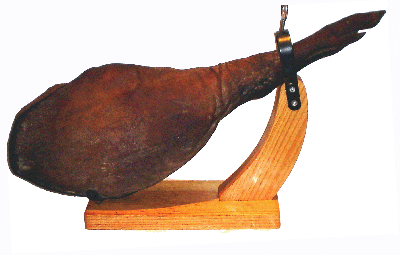Description: The ‘Presunto de Melgaço’ is a smoked ham, the shape of which is obtained using a long and elongated cut, which carves the meat into a beak or tip, retaining the external rind and keeping the foot end/nail intact. It is sold either whole, sliced or in chunks. The raw material used in order to obtain this product comes from fresh shanks weighing over 10 kg, obtained from Bisara pigs, either thoroughbred or the result of cross-breeding, female or male (if male, castration occurs before they are four weeks old) and slaughtered once they have reached a live weight of at least 110 kg and are at least 32 weeks old.
Production method: The transformation of the hams should last at least one year and include the following phases: trimming and massaging of the shanks; salting; drying/smoking; application of protection/repellant; ageing and storage.
Special features: Presunto de Melgaço’ stands out from other products in the same category on the market owing to its long elongated cut, which carves the meat into a beak or tip, retaining the external rind, and keeping the foot end/nail intact. As a result it is visually very different from other products in the same category. Its sensory characteristics are also unique, particularly the slightly salty flavour with a hint of a smoky flavour.
Production area: The geographical area for the production of ‘Presunto de Melgaço’ covers all parishes of the Municipality of Melgaço: Alvaredo, Castro Laboreiro, Chaviães, Cousso, Cristóval, Cubalhão, Fiães, Gave, Lamas de Mouro, Paços, Paderne, Parada do Monte, Penso, Prado, Remoães, Roussas, S. Paio and Vila.
History: The origin of ‘Presunto de Melgaço’ dates back many centuries. In addition to small parcels cultivated under and resulting from subsistence farming, a number of domestic animals, such as Bisaro pigs, have also been reared. The difficulties involved in receiving supplies, owing to the distance between the municipality and major production and consumption centres, stimulated the ingenuity and local popular know-how as regards the traditional processes of salting and drying/smoking for the processing and conservation of pork meat. It is this knowledge which has been passed on from generation to generation until the modern day. ‘Presunto de Melgaço’ or ‘marrã’ was already one of the many ‘gifts’ to be paid to the Portuguese King Manuel in accordance with the royal charter of 3 November 1513 and to the 1483 Diocesan prelate in accordance with the lease for the rental of the Monastery of Fiães (Marques, José; 2004).
Product specification (pdf)
Producer group
Melgaço Rural - Associação de Produtores Locais
Control and certification body
Kiwa Sativa – Unipessoal, Lda.
Control plan
Control plan (pdf)
Publication in EU official journal
Regulamento de Execução (UE) 2015/591 da Comissão de 31 de março de 2015 – JO L99/03 de 16.04.2015
Publicação do pedido de registo (2014/C 423/07) – JO C423/5 de 26.11.2014
Publication in the Portuguese official journal
Aviso (extrato) n.º 4539/2014, de 25.03.2014
Despacho n.º 14837/2012 de 20.11.2012



